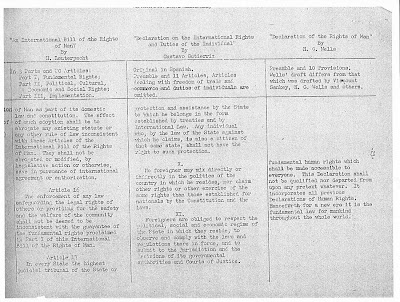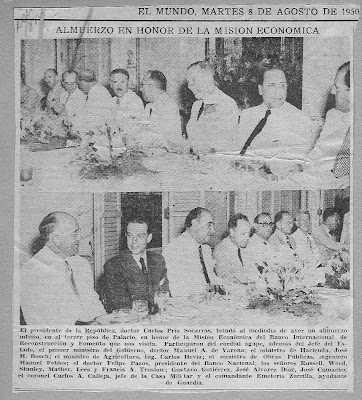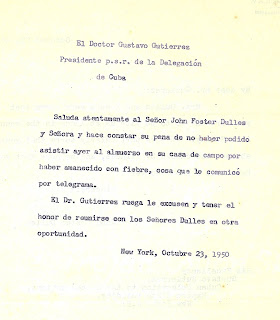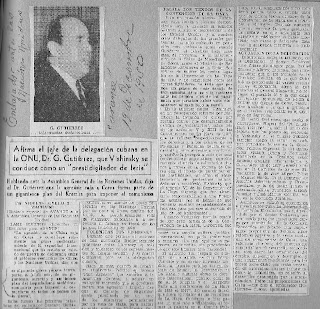
GUSTAVO GUTIERREZ Y SANCHEZ
1895-1959

Speaker of the House, 1940 (portrait by Valderrama)
Jurist Politician Diplomat Economist
Legislator
Author
December 28, 2010
December 27, 2010
Universal Declaration of Human Rights #1


September 4, 2010
UN Conference on Refugees, Atlantic City 1943

March 30, 2010
Cuba's Voice in Geneva and Petropolis 1954

In Geneva: (English translation)
" My country, for instance, is faced with an uneasy economic situation as a result of international action for which the GATT seems to offer no remedy. With it's national economy depending fundamentally on the production of sugar, Cuba is forced to expand it's production in times of national emergency in order to supply the world with it's energy producing product at controlled prices, without compensation in normal times when prices drop, markets are closed by the existence of excessive internal taxes or import permits and the international monetary funds fail to solve the problem of lack of exchange for it's purchase. But in the meantime, our population continues to increase and with it unemployment..."
"We need to defend our sugar production but at the same time take it out of it's role of principal supplier of national economy by diversifying our agricultural production and seeking a reasonable industrialization of our country for the purpose of providing work for Cuba's labor force and increasing it's citizen's purchasing power..."
"It is necessary also to endeavor in some way to mitigate the adverse relation of interchange that takes place in our country---just as it does in all underdeveloped countries---as a result of exporting primary products at low prices, officially or extra-officially controlled, and of importing generally high priced products that are almost never subject to control."
"For this reason the Cuban government in March 24, 1954 began a tariff reform with a dual purpose: 1) to adjust the obsolete Cuban Customs Tariff to modern nomenclatures and techniques and, 2) to protect the economic development of the country..."
"Any attempt at an indefinite freezing or general and indiscriminate reduction of Customs duties, without taking into account the peculiarities of each under-developed nation, would constitute true economic aggression."
"Some representatives of industrialized countries with a large foreign trade seem to be fundamentally preoccupied in finding the way to sell more to others, without giving proper attention to the necessity others also have of selling, in order to be able to buy. In this sense the display of agility is really astonishing because of it's ingenuity; but we would feel more at ease if greater emphasis were placed on the need for raising the standard of living of all the peoples, beginning with the under-developed countries---which have the great majority of the population of the world---in order to achieve a general increase in the purchasing power of all the peoples."
In Petropolis:
"No podemos, los paises latinoamericanos buscar exclusivamente en el exterior la solucion de nuestros propblemas."
"Nuestro pais practica con hechos el principio del auto-desarrollo. Utilizando exclusivamente nuestros recursos economicos y financieros, hemos financiado por 120 millones de pesos (sabido es que el peso cubano esta en paridad con el dolar americano) la retencion del excedente de nuestra zafra azucarera de 1952; hemos construido en este ano de 1953 mas de cuarto mil kilometros de caminos vecinales, cientos de kilometros de carreteras, y varios acueductos y hospitales; hemos adquirido de los propietarios ingleses en 13 millones de pesos los Ferrocarriles Unidos de La Habana y utilizado mas de 7 millones de pesos en su reabilitacion, que estamos llevando a efecto; estamos dragando los puertos; estamos desarrollando a un costo de 14 millones de pesos la primera Central Hidroelectrica del Hanabanilla y contemplamos la inversion de unos 15 millones de pesos en el establecimiento de fabricas de glicerina y de papel utlilizando el bagazo de cana; hemos creado la Financiera Nacional de Cuba, el Banco Cubano del Comercio Exterior y estamos organizando el Instituto Cubano de Investigaciones Tecnologicas; estamos realizando la reforma aranceleria con objeto de adecuar los obsoletos aranceles de aduana cubana a las modernas nomenclaturas y tecnicas de la materia, y de defender el desarrollo economico del pais; y hemos iniciado un Plan de Desarrollo Economico y Social que representa una inversion de 350 millones de pesos en 4 anos. Al observar este gigantesco esfuerzo que significa una mobilizacion de mas de 500 millones de dolares sin la cooperacion, hasta el presente, de ninguna de las agencias internacionales de credito, se comprende hasta que punto preocupa a mi Gobierno la necesidad de combatir el desempleo en nuestro pais."
"Comprendemos perfectcamente que el "role" de lideres de la democracia mundial que actualmente desempena los Estados Unidos de America, los obligan a compromisos y cargas realmente grandes en todas partes del mundo (Japon e Europa post guerra), pero no debe olvidarse que sus mejores amigos estan en este Continente."
"El bienestar economico y social de los 170 millones de personas que habitan al sur del Rio Grande sera la defensa mas efectiva contra las penetraciones exteriores. Pero al propio tiempo, la desatencion de ese bienestar constituiria una linea de intensa y creciente peligrosidad." (En el ano 1948 G.G. le comento a un pariente que temia que Cuba podria ser el primer pais de America Latina a caer en manos de los comunistas).
(English translation)
"We, the Latin American countries, cannot look abroad exclusively for the solutions to our problems...We believe that the economic development of a country depends fundamentally as much on it's own efforts as upon it natural resources..."
"Our country practices the principle of self-development. By using exclusively our economic and financial resources we have financed at 120 million pesos ( and it is known that the Cuban peso is on a par with the American dollar) the retention of the surplus of our 1952 sugar crop; we have constructed during this year, 1953, more than 4,000 kilometers of feeder or side roads, hundreds of highways and several aqueducts and hospitals; we have acquired the United Railways of Havana from it's English owners for 13 million pesos and have spent more than 7 million pesos in it's rehabilitation which is now underway; we are dredging our ports; we are putting up at a cost of 14 million pesos, the First Central Hydroelectric Plant of the Hanabanilla River and are contemplating the investment of 15 million pesos in the establishment of glycerine and paper plants using sugar cane bagasse as raw material; we have organized the Financiera Nacional de Cuba, the Cuban Foreign Trade Bank, and are organizing the Cuban Institute of Technical Research; we are undertaking revision of our tariffs for the purpose of putting our obsolete Customs Tariffs in line with modern nomenclatures and techniques on the subject of protecting the economic development of a nation; and we have started a Plan of Economic and Social Development that represents an investment of 350 million pesos in 4 years. In observing this gigantic effort, which involves the mobilization of more that 500 million pesos without the cooperation up to the present time of any of the international credit agencies, the extent to which my Government is preoccupied by the need for combating unemployment in our country can be understood."
"We realize perfectly well that the role of leader of world democracy, at present being held by the United States of America, obliges it to undertake truly large commitments and burdens all over the world, ( post war Europe and Japan) but it should not loose sight of the fact that it's best friends are on this Continent."
"The economic and social welfare of the 170 million people who live south of the Rio Grande will be the most effective defense against foreign penetration. But at the same time, failure to look after that welfare would create a line of intensive and growing danger" (In 1948 G.G. commented to a relative that he feared that Cuba could become the first country in Latin America to fall into the hands of communism.)
Argentina Economic Conference 1954
U.N. Technical Assistance 1952


The above photographs were taken (top) in December of 1952 and (bottom) on July 31, 1952 in the offices of Dr. Gustavo Gutiérrez. He was president of the Junta Nacional de Economia (National Board of Economy) and Minister without Portfolio. The following year he would accept the post of Minister of Finance.
In the top photograph we see the United Nations envoys with the Cuban officials toasting. Gustavo's daughter, Yolanda who worked at the time as his Administrative Assistant, can be seen in the lower left hand corner. In the bottom photo we see Senator Miguel Suarez Fernandez, Jose Luis Avalos, Miguel Penabad among others. The reason for this gathering was the result of a United Nations mission on technical assistance for Cuba.
These offices were originally the residence of the former president of Cuba, Miguel Mariano Gomez. It is situated on the corner of Prado and Trocadero streets.
President Prio honors Int'l Bank of Reconstruction and Development 1950

March 9, 2010
John Foster Dulles letter, 1950


GG Chairman U.N. Economic Committee 1950


Dr. Gustavo Gutiérrez was unanimously appointed chairman of the Economic Committee of the United Nations for the 5th Session of the General Assembly in Flushing Meadows, New York in January, 1951. Dean Acheson was Secretary of State of the United States at the time. Dr. Gutérrez can be seen in the series of portraits in the bottom left hand corner of the photograph above. He's the only delegate wearing glasses.
The second document, "Personalidades de la Asamblea, Los Presidentes de las Comisiones" is a publication (October 15, 1950) introducing the new elected United Nations chairmen (presidentes) of various committees (comiciones). We see Dr. Roberto Urdaneta Arbeláez (Primera Comisión) of Colombia, Dr. Victor Andres Belaunde (Comisión Ad Hoc) of Peru and Dr. Gustavo Gutiérrez (Segunda Comisión) of Cuba.
One month earlier in December of 1950 Dr. Gutiérrez attacked the Soviet Ambassador for his country's support of the Chinese invasion of Korea and for attempting to justify China's actions by misquoting the 1907 Convention of the Hague. Please see January 2009 blog entry "GG Attacks Soviet Vyshinski at the U.N. 1950" to read the article in the original Spanish and for a "remedial" English translation please see blog entry from March 2010, "GG Accuses Soviet Vyshinsky at the UN 1950."
March 8, 2010
GG Accuses Soviet Vishinsky at UN 1950

On December 19, 1950, Nicolas Rivero y Machado wrote an article for the Cuban newspaper, Avance, reporting that the head of the Cuban delegation to the Fifth General Assembly of United Nations, Dr. Gustavo Gutiérrez, had accused the Soviet Ambassador, Andrei Vyshinsky of conducting himself like a circus clown and declared that, "the aggression in Korea by Red China doesn't only constitute a worrisome rupture in international security, creating a non-declared state of war between China and the United Nations, but rather is something graver that forms part, in my opinion, of a gigantic, bold and ambitious plan by Soviet-communist imperialism to impose communism in all the nations of the world." The reporter added that, "Gutiérrez is one of the few delegates in the United Nations, perhaps the only one, that has destroyed Vyshinsky's pseudo legal argument, putting the former Stalin prosecutor of the Trotsky purges of 1938 on the defensive."
For a better resolution of the above original Spanish article, please see blog entry from January 2009 "GG Attacks Soviet Vyshinsky at the UN, 1950." My apologies for a less than adequate English translation below.
"During these sessions both the Soviet Foreign Minister, the most agile and talented representative of the Soviet bloc, and the head of the Cuban delegation confronted one another on numerous occasions. In defense of the newly created "Acheson Plan," which authorized the General Assembly to take action in case of an act of aggression on the part of a member nation, thus over-riding the veto power of any Security Council member, in this case that of Soviet Ambassador Malik, Gutiérrez infuriated Vyshinsky when the former exposed the contempt the USSR has for smaller nations. Gutiérrez stated, "If Vyshinsky's criteria was allowed to prevail the world would fall back to the times of the Congress of Vienna when a handful of great powers and influential statesmen imposed their will over Europe and reorganized the map of Europe at their whim."
"In addition, Vyshinsky, whose sarcasm and cynicism didn't fail to unnerve American ambassador, Senator Warren Austin, and other delegates, was put in his place when Dr. Gutiérrez accused him of falsely interpreting the legal texts of the 1907 Convention of the Hague and by conducting himself like one of those circus clowns that plays those "now you see it, now you don't" parlor tricks. And when Vyshinsky had the audacity to read certain Articles of the Hague Convention to justify China's invasion of Korea, Gutiérrez, who possesses a thorough knowledge of international judicial law couldn't contain himself and exclaimed, "the legal passage he is quoting is not correct, it's incredible, without precedent, what this man is doing!" The following day, with the assistance of fellow Cuban diplomats Guy Perez-Cisneros, Dr. Herminio Rodriguez, eminent judicial expert and Colonel Borel, a specialist on the Hague, Dr. Gutiérrez embarrassed Vyshinsky by discrediting his claim. Before a stunned audience Gutiérrez exposed the fantastic falsification of legal texts by the Soviet delegate. Gutiérrez quoted from A.P. Higgins' book, Article VI of the Hague Convention and revealed that Mr. Vyshinsky had substituted the word "individually" with "separately" with the intention of justifying China's invasion of Korea."
"Dr. Gutiérrez added that Vyshinsky omitted Article IV which prohibits a neutral country from getting involved militarily. And finally destroyed Vyshinsky's futile attempts to fool the delegates present by reading Colonel Borel's report which states that Article IV is concordant with Article VI which Ambassador Vyshinsky neglected to mention, which prohibits the crossing of national boundaries en masse by foreign military."
"Vyshinsky's response, two days later, was quite weak. He recognized that, "the delegate from Cuba is a parliamentarian who has a way with words," but counterattacked Gutiérrez for citing texts in English and French and not in Spanish, explaining that Gutiérrez's argument was invalid since the translation from Russian to French was incorrect. The Cuban delegate smiled widely and didn't respond because everyone knows that the only official languages of the Hague are French and English. Later, Gutiérrez commented that it wasn't worth the effort prolonging a debate in which such an aggressive and intelligent adversary had become so soft and deficient."
When asked about the other members of the Cuban delegation Gutiérrez had nothing but praise for Carlos Blanco and Alberto Espinosa who shared with him the duties in the Committee on Politics. Cuba was a co-sponsor of various important resolutions; to authorize General Mc Carthur to go beyond the 38th parallel; demand that Peking withdraw it's troops from Korea, a similar resolution to the one Soviet ambassador Malik vetoed in December (1949) in the Security Council. According to the N.Y. Herald Tribune's correspondent Rogers, "Gustavo Gutiérrez has been the only delegate to expose Vyshinsky in the Committee on Politics.
Gutiérrez also praised Francisco Ichaso (Special Committee on Politics), ambassador Manuel Baraña and Herminio Rodriguez (Commission on Social, Humanitarian and Cultural Affairs), Guy Perez-Cisneros (Commission on Fiduciary Affairs), José Miguel Ribas and Manuel Hevia (Commission on Administrative and Budget Affairs), Francisco Garcia Amador and José Manuel Cortina (Judicial Committee). Ambassador Gutiérrez, who was voted unanimously to preside over the Committee on Economics, also congratulated Julio Le Riverand for his work. In this committee an important proposal from Poland was debated regarding agrarian reform and the national rent, as well as, various proposals from Cuba: affects of commercial exchange on economic development; statistics on employment, sub-employment and unemployment and one very important proposal to underdeveloped countries such as Cuba who is trying to mechanize certain industries, ie., tobacco and it's affects on labor. "All of Cuba's proposals", Dr. Gutiérrez tells us, "were approved."
March 5, 2010
GG Didn't greet Gromyko #3 (daughters mobilize) 1949





.jpg)





%231.jpg)
%232.jpg)
